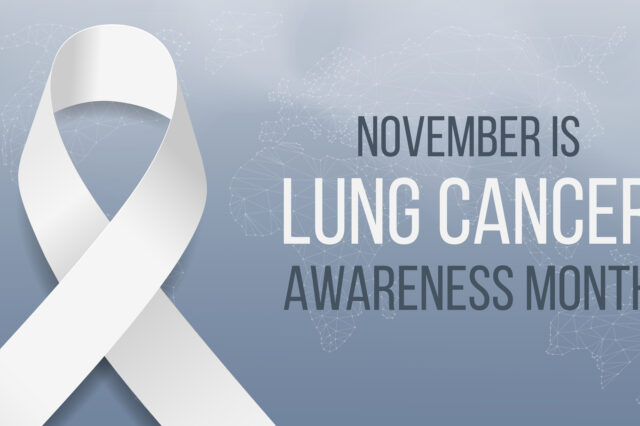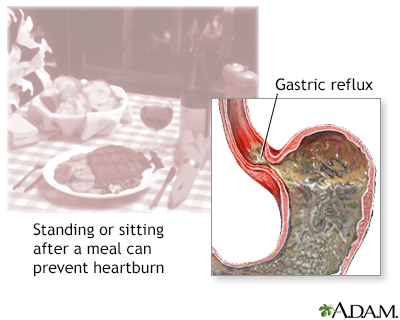Lung Cancer Awareness Month: Early Detection Makes the Difference
Lung cancer has a way of staying hidden and becoming increasingly fatal the longer it does so. There are enormous benefits to shining light on this particular…

Update your location to show providers, locations, and services closest to you.
Esophageal cancer is cancer that starts in the esophagus. This is the tube through which food moves from the mouth to the stomach.
Cancer - esophagus
Esophageal cancer is not common in the United States. It occurs most often in men over age 50 years.
There are two main types of esophageal cancer; squamous cell carcinoma and adenocarcinoma. These two types look different from each other under the microscope.
Squamous cell esophageal cancer is linked to smoking and drinking too much alcohol.
Adenocarcinoma is the more common type of esophageal cancer. Having Barrett esophagus increases the risk of this type of cancer. Acid reflux disease (gastroesophageal reflux disease, or GERD) can develop into Barrett esophagus. Other risk factors include smoking, being male, or being obese.
Symptoms may include any of the following:
Tests used to help diagnose esophageal cancer may include:
Stool testing may show small amounts of blood in the stool.
EGD will be used to obtain a tissue sample from the esophagus to diagnose cancer.
When the cancer is only in the esophagus and has not spread, surgery may be done. The cancer and part, or all, of the esophagus is removed. The surgery may be done using:
Radiation therapy may also be used instead of surgery in some cases when the cancer has not spread outside the esophagus.
Either chemotherapy, radiation, or both may be used to shrink the tumor and make surgery easier to perform.
If the person is too ill to have major surgery or the cancer has spread to other organs, chemotherapy or radiation may be used to help reduce symptoms. This is called palliative therapy. In such cases, the disease is usually not curable.
Besides a change in diet, other treatments that may be used to help the patient swallow include:
You can ease the stress of illness by joining a cancer support group. Sharing with others who have common experiences and problems can help you not feel alone
When the cancer has not spread outside the esophagus, surgery may improve the chance of survival.
When the cancer has spread to other areas of the body, a cure is generally not possible. Treatment is directed toward relieving symptoms.
Complications may include:
Call your health care provider if you have difficulty swallowing with no known cause and it does not get better. Also call if you have other symptoms of esophageal cancer.
To reduce your risk of cancer of the esophagus:



Ku GY, Ilson DH. Cancer of the esophagus. In: Niederhuber JE, Armitage JO, Kastan MB, Doroshow JH, Tepper JE, eds. Abeloff's Clinical Oncology. 6th ed. Philadelphia, PA: Elsevier; 2020:chap 71.
National Cancer Institute website. Esophageal cancer treatment (PDQ) - health professional version. www.cancer.gov/types/esophageal/hp/esophageal-treatment-pdq. Updated July 15, 2021. Accessed September 1, 2021.
National Comprehensive Cancer Network website. NCCN clinical practice guidelines in oncology (NCCN guidelines) Esophageal and esophagogastric junction cancers. Version 4.2021 – August 3, 2021. www.nccn.org/professionals/physician_gls/pdf/esophageal.pdf. Updated August 03, 2021. Accessed September 1, 2021.
Our community and patient programs provide great value to patients, families and loved ones. People can find support, educational materials, expert consultants and more. In most instances, these programs are offered free of charge.
Improves health and quality of life for long-term cancer survivors.
An educational and networking event that brings together cancer patients, survivors, caregivers and health care professionals.
Interdisciplinary facility that helps support the diverse needs of individuals and families.
Pain management treatment plans for cancer patients.
Helps individuals access high-quality cancer screening, prevention and treatment services.
Can assist you through the treatment process in a number of practical and supportive ways.
Peer companionship for adolescents and young adults living with serious illness.
Offers classes, programs, groups, activities, resources and health fairs throughout Gainesville, Ocala and The Villages communities.
Lung cancer has a way of staying hidden and becoming increasingly fatal the longer it does so. There are enormous benefits to shining light on this particular…

Gastroesophageal reflux disease, or GERD, may have links to esophageal cancer. GERD is a condition in which stomach acid leaks into your esophagus, or food…
